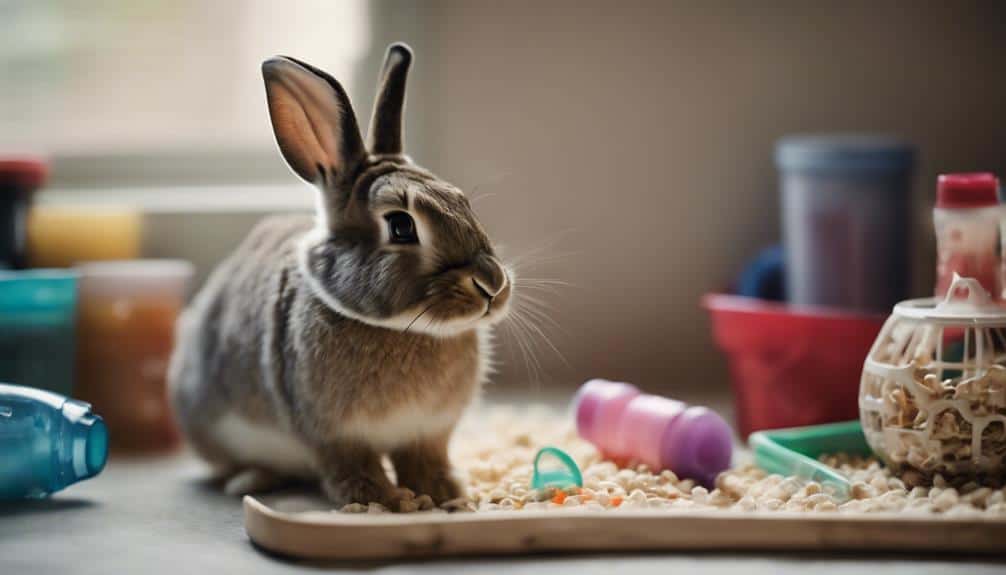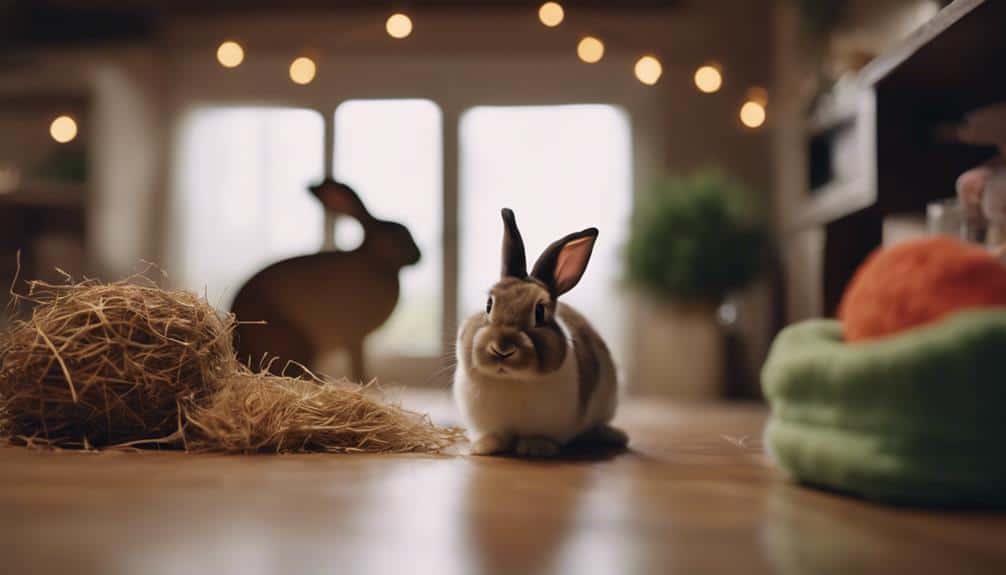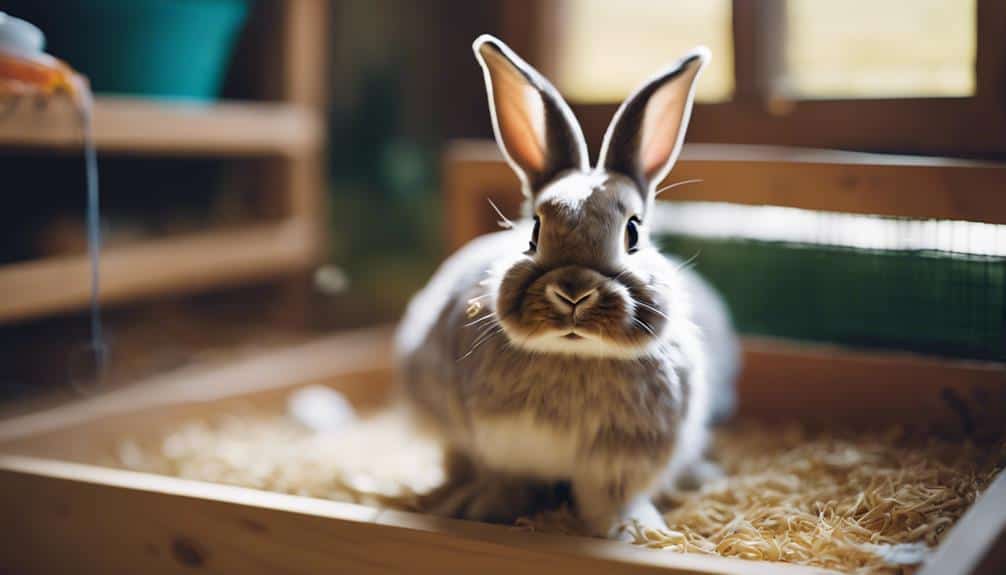So, you're wondering about the actual cost of owning a rabbit?
It's true that there's a financial commitment involved, and the expenses can vary quite a bit.
From the initial setup to ongoing care, several factors contribute to the overall expense of owning a rabbit. This includes the costs associated with high-quality feed, bedding, and veterinary care, which are essential for the health and well-being of the pet. Furthermore, it’s important to consider that the average rabbit survival rate in litters can affect long-term ownership costs, as responsible breeding practices typically ensure healthy outcomes for both the mother and the offspring. Overall, rabbit ownership requires a commitment not only in terms of finances but also in dedicated time and attention to their unique needs.
Let's break down the costs and necessary investments to ensure your furry friend's well-being.
Contents
- 1 Key Takeaways
- 2 Initial Costs of Owning a Rabbit
- 3 Rabbit-Proofing Expenses
- 4 Ongoing Monthly Expenses
- 5 Spay and Neuter Surgery Costs
- 6 Annual Wellness Exam Expenses
- 7 Emergency Veterinary Costs
- 8 Pet Sitting Costs for Rabbits
- 9 Budgeting Tips for Rabbit Care
- 10 Recommended Rabbit Care Products
- 11 Conclusion
Key Takeaways
So you're thinking of getting a rabbit as a pet? That's great! But before you bring one home, it's essential to know how expensive they can be.
Initially, you'll need to shell out between $35 to over $100 to buy a rabbit from a pet store or breeder. Then, you'll need to set up a habitat, which can add another $120 to $200 to your expenses.
Annual wellness exams are a must, and they'll cost you around $125. But that's not all – if your rabbit needs extra treatments, you'll need to factor those in as well. And let's not forget about emergency vet fees, which can range from $300 to a whopping $2,500 depending on the treatment.
If you're going out of town and need someone to take care of your rabbit, pet sitting rates can vary from $50 to $100 per day. All these costs can add up quickly, so it's crucial to factor them into your budget before bringing a rabbit into your life.
Initial Costs of Owning a Rabbit

When you're thinking about getting a rabbit, you need to consider the initial costs involved. There's more to it than just buying the rabbit itself.
You'll also need to factor in the cost of setting up a suitable habitat, rabbit-proofing materials, spaying or neutering, and getting all the necessary supplies.
The cost of buying a rabbit from a pet store or breeder can range from $35 to over $100. But if you adopt from a shelter, you might be able to save some money.
Setting up a habitat for your rabbit can add another $120 to $200 to your expenses. This includes essentials like an enclosure, food and water bowls, a litter box, nail clippers, and grooming tools.
Spaying or neutering your rabbit is crucial for their health, and it can cost between $300 to $600, depending on various factors.
You'll also need to get some initial supplies like bedding, food, and toys, which can cost around $40 for one rabbit.
It's essential to have a well-prepared environment and all the necessary items for your new pet rabbit to ensure they've a safe and happy home.
Rabbit-Proofing Expenses
When it comes to rabbit-proofing your home, you'll want to consider a few key expenses.
First, there's fencing. You'll need to block off areas where your rabbit can get into trouble. Fencing cubes can be a big help with this.
Next, think about anti-chew solutions. Rabbits love to chew, and they can do a lot of damage if you're not careful. Wire covers and scratching mats can help prevent this kind of destruction.
Finally, you'll want to think about safe flooring options. Rabbits can scratch and chew on floors too, so you'll want to make sure you've got a surface that can withstand their attention.
Investing in these products can add up, but it's worth it to keep your home and rabbit safe.
You can expect to pay around $15 for wire covers, and up to $50 for flexible cat scratchers that can also work for rabbits.
Cost of Fencing
Protecting your expensive rabbits from predators and unwanted intruders is crucial, and that's where high-quality fencing comes in. The cost of fencing can vary greatly depending on the type of material, the size of the enclosure, and how complex the installation is.
On average, you can expect to spend between $200 to $1000 for fencing, depending on the quality and features of the system. Wire mesh fencing is a popular choice for rabbit enclosures because it's durable and can keep predators out.
The cost of wire mesh fencing usually ranges from $0.50 to $2 per square foot, making it a cost-effective option for rabbit-proofing your property.
If you want to add some aesthetic appeal to your rabbit's living space, wooden fencing might be the way to go. However, it tends to be more expensive than wire mesh options.
When budgeting for fencing expenses, it's essential to prioritize your rabbits' safety and security while considering the overall look and durability of the fencing material.
Anti-Chew Solutions
Rabbit-proofing your living space is essential to prevent damage and ensure your furry friends' safety. One of the most effective ways to do this is by investing in anti-chew solutions. These tools and products can help deter chewing behaviors and save your home from rabbit-induced destruction.
So, what are these anti-chew solutions, and how much do they cost? Let's take a look:
| Anti-Chew Solutions | Costs |
|---|---|
| Wire Covers | $15 |
| Plastic Mats | $35 |
| Fencing Cubes | $40 |
| Scratching Mats | $35 |
| Flexible Cat Scratchers | $35 |
Wire covers are a cheap and effective way to safeguard wires and cords from curious bunnies, costing just $15. Plastic mats provide comfort for your rabbits while protecting your carpets, and they'll set you back $35. If you need to block off certain areas or prevent baseboard chewing, fencing cubes are a customizable solution priced at $40. You can also repurpose flexible cat scratchers for baseboards and rugs, which is a cost-effective way to prevent rabbit damage, also priced at $35.
Safe Flooring Options
To make your living space rabbit-friendly and keep costs under control, you need to think about safe flooring options. When you're setting up your rabbit's hutch or rabbit-proofing your home, you've got to put your rabbit's safety and comfort first.
So, what're your options? Rubber mats are a great choice. They're easy to clean, soft on your rabbit's paws, and provide a comfortable, non-slip surface for them to hop around on.
Vinyl flooring is another good option. It's durable, waterproof, and easy to clean, making it perfect for areas where your rabbit spends a lot of time. Plus, it can withstand those sharp rabbit nails without getting scratched.
If you're looking for something a bit more natural and eco-friendly, cork flooring is the way to go. It's soft, warm, and provides good insulation. It's also gentle on your rabbit's joints and makes for a comfortable surface for them to rest on.
Ongoing Monthly Expenses
Managing your monthly expenses for your rabbits is crucial for maintaining financial stability in the long term. When you think about the monthly costs of owning rabbits, you've got to budget for veterinary care – that's everything from routine check-ups to unexpected emergencies.
On average, the annual cost for veterinary care can add up to a significant portion of your ongoing expenses.
One way to save money in the long run is to invest in a hay feeder. This helps reduce waste and provides your rabbits with a constant supply of hay, a staple in their diet.
Having an emergency fund specifically for your rabbits can give you peace of mind in case unexpected medical bills arise. By planning ahead and being proactive, you can mitigate the financial strain of unforeseen circumstances.
You can also explore money-saving options like purchasing supplies in bulk or finding discounts on rabbit essentials. This helps you stretch your budget further.
Being mindful of your ongoing expenses and implementing cost-saving strategies can contribute to a more sustainable and financially secure rabbit ownership experience.
Spay and Neuter Surgery Costs
Managing your rabbits' ongoing medical expenses includes planning for the costs associated with spay and neuter surgery, which is a crucial part of being a responsible pet owner. Spaying or neutering your rabbits helps control the pet population and also benefits their health and well-being.
The cost of spaying or neutering your rabbits varies depending on factors like location, the vet performing the procedure, and any additional services needed. For example, some vets might charge more than others, and some rabbits might require extra care during the procedure.
After the surgery, your rabbits will need follow-up visits to the vet to monitor their recovery and make sure they're healing properly. These visits are usually routine, but they're still important to ensure your rabbits are doing okay.
In some cases, unexpected complications can arise after the surgery, leading to emergency vet visits and additional expenses. These unexpected costs can be stressful, but it's essential to be prepared for them.
Being prepared for the one-time cost of spaying or neutering your rabbits and understanding the potential follow-up visits and unexpected costs is crucial for providing the best care for your furry friends. By prioritizing their health through spay and neuter surgeries, you can help them live happier and healthier lives.
Annual Wellness Exam Expenses

Annual wellness exams are a must for your rabbit's health and well-being. These exams typically cost between $75 and $200, depending on the veterinary clinic you visit.
During the exam, the vet will give your rabbit a thorough check-up to see if they're healthy and thriving. They'll look for any signs of illness, give them any necessary vaccinations, and offer guidance on how to care for your rabbit and what to feed them.
Regular wellness exams are super important because they can help catch any potential health problems early on. This can save you a lot of money and stress in the long run by preventing costly emergency vet visits.
Some clinics might even offer discounts on spay/neuter surgeries, which can be a big help for rabbit owners. On average, you can expect to pay around $125 for an annual wellness exam, not including any extra costs for vaccinations or other treatments.
| Wellness Exam Costs | Price Range |
|---|---|
| Low | $75 |
| Average | $125 |
| High | $200 |
Emergency Veterinary Costs
Emergency veterinary costs for rabbits can be super pricey, ranging from hundreds to thousands of dollars depending on the treatment needed.
You might be facing a huge bill, so it's crucial to consider whether you can afford the treatment when discussing emergency vet fees with your vet.
Think about it – being financially prepared is key to making sure you can give your rabbit the care they need if something unexpected happens.
You don't want to be stuck in a situation where you can't afford to get your rabbit the help they need.
Emergency Vet Fees
Emergency vet fees for rabbits can be pretty steep, ranging from $300 to $2,500 depending on how bad the condition is and what kind of treatment is needed. In emergency situations, you might've to pay for things like surgery, medicine, and hospital stays, which can add up fast.
One thing to keep in mind is that pet insurance can help cover some of the costs, but it's not always the best deal for rabbits. Another option is to set aside a pet emergency fund of around $1,000 to $2,000. This way, you'll have a safety net in case you need to take your rabbit to the vet unexpectedly.
Regular check-ups with your vet and taking care of your rabbit's health through preventive measures are also really important. By doing this, you can reduce the chances of having to make an emergency vet visit and paying those high fees. It's worth it to prioritize your rabbit's health to avoid those big bills.
Treatment Affordability
When your rabbit needs emergency vet care, the cost can vary widely depending on how serious the condition is and what treatment is required. For example, emergency vet costs for rabbits can range from $300 to $2,500. If your rabbit has a serious issue like gastrointestinal stasis, a respiratory infection, or an injury, they may need expensive surgery, hospitalization, and medication.
Pet insurance can help cover these expenses, but the premiums for rabbits can be high – over $100 per month. That mightn't be the most cost-effective option. A better approach might be to save a pet emergency fund of $1,000 to $2,000. This way, you'll have the money set aside if your rabbit needs unexpected vet care.
Regular vet check-ups, vaccinations, and preventative care for your rabbit can also help minimize the risk of emergency visits and reduce costs in the long run. By being proactive about your rabbit's health and seeking timely vet care, you can better manage the affordability of treatments during emergencies.
Financial Preparedness
To make sure you're ready for unexpected vet bills for your rabbit, it's a good idea to set aside a special emergency fund of $1,000 to $2,000. If your rabbit suddenly needs medical attention, having this fund can give you peace of mind and help your pet get the care they need without breaking the bank.
You should expect to spend some money on emergency vet care. The cost can vary widely, from a few hundred dollars to several thousand, depending on how serious the issue is.
Setting aside $1,000 to $2,000 in an emergency fund can cover potential vet expenses for your rabbit. This way, you'll be prepared in case something unexpected happens.
Regular check-ups and vaccinations can also help reduce the likelihood of emergency vet costs. By catching health issues early on, you can avoid more costly problems down the line.
Being financially prepared for your rabbit's medical needs is a key part of being a responsible pet owner.
Pet Sitting Costs for Rabbits

The daily rate for hiring a pet sitter for your rabbit can range from $50 to $100, depending on the sitter's experience and location.
The cost also depends on how much care your rabbit needs. If your rabbit requires a lot of attention, you might need to budget more.
Professional pet sitters usually charge between $20 to $40 per visit, and they'll need to visit your rabbit at least twice a day to make sure it's doing okay.
If you need overnight pet sitting, which includes more extensive care, you can expect to pay around $30 to $60 per day. Some pet sitters might offer package deals or discounts if you book them for a longer period, which can help bring the cost down.
It's really important to do your research and interview potential pet sitters to make sure they've experience caring for rabbits and can provide the level of care your rabbit needs.
Budgeting Tips for Rabbit Care
Looking to save money while providing high-quality care for your rabbit?
You can cut costs without compromising on your pet's well-being.
One way to do this is by buying supplies in bulk.
Purchasing hay and pellets in bulk can greatly reduce your monthly costs by up to 50%.
Look for deals at local farms or online suppliers to get the best prices.
Another way to save is by adopting a rabbit from a shelter instead of buying from a breeder.
Not only will you be providing a loving home to a rabbit in need, but you can also save up to $100 in initial costs.
It's also important to provide a healthy diet for your rabbit.
Investing in a proper rabbit diet and lifestyle can lower emergency healthcare bills by up to 75%.
This means guaranteeing your rabbit gets the right nutrition to prevent costly health issues down the line.
Recommended Rabbit Care Products

To guarantee your rabbit's health and happiness, make sure you have the essential care products on hand.
When it comes to your rabbit's diet, Timothy Hay is a must-have for their digestive health. It provides essential fiber, and Small Pet Select Timothy Hay is a popular choice among rabbit owners due to its high quality.
You'll also want to get pellets specifically formulated for pet rabbits to ensure they're getting all the necessary nutrients. Oxbow and Kaytee offer well-balanced options for your furry friend.
If you have a show rabbit or a rare breed, you'll need to invest in some grooming tools.
A slicker brush and nail trimmers are essential for maintaining their coat and overall appearance.
Don't forget to get a suitable small animal shampoo to ensure proper hygiene.
Conclusion
Now that you know what to expect when it comes to the costs of owning a rabbit, you're probably thinking about how to budget for your pet.
We'll be publishing an article soon that will give you practical tips on how to save money while still giving your rabbit the best care possible.
These insights will be super helpful, so be sure to check it out!






